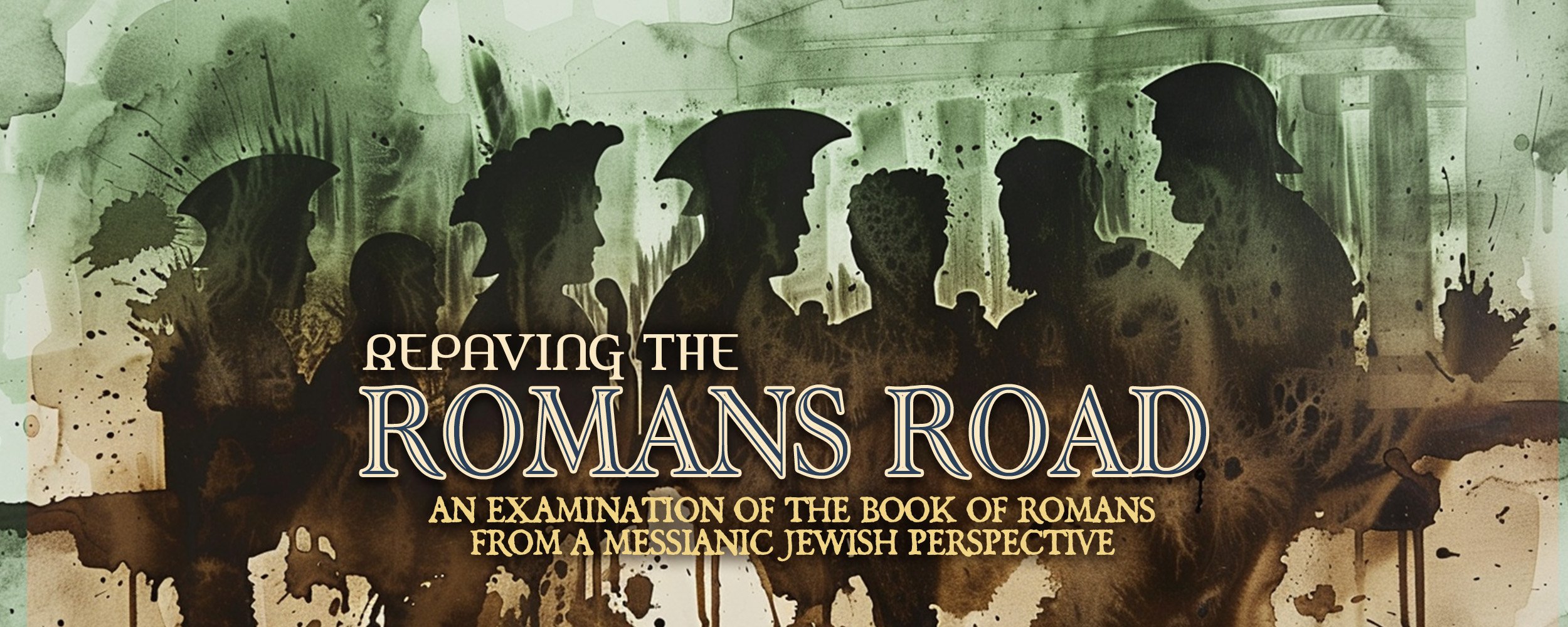
Be sure to download the corresponding study guide for each part in the series!
Ready to challenge everything you thought you knew about Romans?
-

Part 1: The Most Influential Book in the New Testament
The Apostle Paul’s writings have profoundly shaped Christian theology, with his letter to the Romans standing as one of the most pivotal and influential texts. In a new series, “Repaving the Romans Road,” Rabbi Damian delves into the book of Romans from a Messianic Jewish perspective. This week, we will explore the impact this book has had on Western theology and some of the perspectives that have informed its interpretation. Join us in the weeks ahead as we reexamine this foundational epistle, uncovering its true meaning and relevance for both Jews and Gentiles today.
-

Part 2: The Audience of Romans
To truly grasp the profound teachings in the book of Romans, one must first understand the audience Paul addresses. Without recognizing the specific group Paul is speaking to, the depth and purpose of his message can be easily misunderstood. This week's message, "The Audience of Romans," aims to shed light on the recipients of Paul's letter, highlighting how this context is crucial for interpreting his development and intentions throughout the epistle.
-

Part 3: Paul's Mission
2nd Peter tells it plainly — Paul’s writings are not always easy to understand and can be easily misapplied. This certainly has proven true regarding the interpretation of Romans. However, understanding Paul’s mission and intention can help us put the pieces of Romans properly in place and truly see the depth and purpose of the apostle’s passionate work.
-

Part 4: Paul & Torah
In these first few foundational messages of the Roman series, we’ve identified what the traditional perspective has taught for thousands of years, reevaluated those teachings, and suggested new interpretations. This this weeks teaching continues along that trajectory, this time, revealing the truth about Paul’s perspective on the law—the Torah of Moses—and his Jewish heritage.tion goes here
-

Part 5: Original Sin
This week, we dive headfirst into Chapter 1, where Paul is often seen as presenting the universal condemnation of humanity and explaining our “original sin” nature. But what if there's more to the story? We'll unravel a different perspective that not only challenges this traditional view but also reveals the true foundation Paul is laying for the powerful messages that follow.
-

Part 6: The So-Called Jew
The traditional interpretation of Romans suggests that in Chapter 2, Paul shifts his focus to the sinfulness of the Jewish people. However, when we consider the rhetorical structure and flow of the letter, a very different and significant intention emerges behind Paul's words. In this teaching, we’ll uncover the true identity of the so-called Jew and what Paul is really addressing.
-

Part 7: Works of the Law
What are these "Works of the Law" that Paul condemns in Romans 3? Is it the Torah, as everyone claims, or have we completely misunderstood what he is saying? In Romans chapter 3, Paul continues his dialogue with a critical conversational partner, introducing the term ‘works of the law.’ But can we trust the traditional interpretation that Paul is condemning the Torah as legalistic works for salvation? Or is Paul addressing his Roman audience, teaching them what they need to understand about the law? Find out in this week’s message.
-

Part 8: Our Father Abraham
In Part 8 of "Repaving Romans Road," we dive into Romans 4 and explore Paul’s continued focus on his audience in Rome, particularly how they can find entry into the family. There is still much talk of circumcision/conversion. But here Paul traces the story back to Abraham, the father of many, whose faith before circumcision opens a door for Gentile inclusion, and the opportunity to see themselves connected to the family of God through the promises made to Abraham. In this chapter, we see Paul continue to brilliantly illustrate to the nations how faith—not the flesh—unites Jews and Gentiles into God’s eternal family.
-

Part 9: Not Under the Law
In Part 9 of the "Repaving Romans Road" series, we dive into Romans 5-6 to clarify one of Paul's most well-known (and equally misunderstood) statements, "not under the law but under grace.” This teaching again explains the importance of understanding who Paul is talking to, why he’s saying what he says, and most importantly, what the practical application of that idea should like for his Roman audience. We’ll continue to see Paul emphasizing the importance of understanding the Law’s role in revealing sin, not offering salvation, and show that Paul never abandons the Torah’s value for all humanity.
-

Part 10: Life in the Spirit
Romans 7 has played a pivotal role in shaping Christian theology throughout the centuries. Traditionally, it has been understood not only as an account of humanity's futile struggle to live according to God's law, but also as Paul's own story and his subsequent condemnation of his former life under the law. However, as we’ve done throughout this series, this week’s exploration of Romans 7 and 8 will offer a fresh perspective on this concept—one that may profoundly change how you understand Paul’s message moving forward.
-

Part 11: Chapters 9-11, An Overview
In this overview of Romans 9-11, we explore what Paul is truly saying—and not saying—about God’s promises to Israel and the inclusion of Gentiles. Are these chapters a detour, or the climax of his message? Let’s look at how they challenge traditional interpretations and reveal Paul’s deeper purpose.
-

Part 12: Chapter 9—All Israel Is Not Israel?
Romans 9:6 is often misunderstood to support Replacement Theology, the idea that the Church has replaced Israel in God’s plan. This interpretation not only distorts Paul’s intent but also damages our understanding of God’s faithfulness and character. In this teaching, we expose the flaws in this traditional view and uncover Paul’s true message: God’s promises to Israel stand firm and His covenant faithfulness is unshakable. This matters for both Jews and Gentiles today!
-

Part 13: Chapter 10—Christ Is The End of the Law
What does Paul mean by “Christ is the end of the Law” or “There is no distinction between Jew and Gentile”? How do these ideas relate to the Torah, the future of the Jewish people, and Jew-Gentile relations in Rome? This week, we reevaluate centuries of traditional interpretations to uncover Paul’s true message.
-

Part 14: Chapter 11, Part 1—Broken Branches
Has God rejected His people? In Romans 11, Paul tackles a dangerous misconception brewing among the Roman Gentile believers: that Israel has been replaced in God’s plan. With urgency, Paul unveils the “critical exigency” and warns against it. Through the olive tree allegory, Paul explains God’s faithfulness, the inclusion of Gentiles, and the unbreakable covenant with Israel. This sermon unpacks the climax of Romans, revealing profound truths about God’s promises and purposes.
-

Part 15: Chapter 11-Part 2: All Israel Will Be Saved
Paul’s olive tree analogy in Romans 11 reveals a profound mystery: God’s enduring plan for Israel and the nations. This teaching unpacks Paul’s passionate plea against arrogance, the temporary ‘callousness’ of Israel, and the divine purpose of bringing Jews and Gentiles together under Messiah. What does ‘All Israel will be saved’ truly mean? Dive into this deep exploration of redemption, faithfulness, and the irrevocable gifts of God.
-

Part 16: Chapter 12–13: A Living Sacrifice
Romans 12–13 continues Paul’s teaching on community harmony, humility, and unity between Jews and Gentiles. In this message, we’ll explore how these chapters build directly on his earlier points, and now provide practical advice for living together. Rabbi Damian also offer a different take on the traditional understanding of Romans 13. Discover how Paul’s call to humility and respect remains central to his vision for a unified community, which we’ll see is really the heart of Paul’s message.
-

Part 17: Chapter 14: The Weak & The Strong
Romans 14 is often misread as Paul dismissing kosher laws or Jewish practices, but is that what’s really happening? Rabbi Damian unpacks Paul’s discussion of the “weak” and “strong,” revealing that the real issue isn’t about food at all—it’s about faith, humility, and cooperation. How should Gentiles and Jews in Messiah navigate their differences? What does this teach us about the Kingdom of God? Join us as we challenge traditional interpretations and explore Paul’s vision for a united, diverse community rooted in love and mutual respect.
-

Conclusion: One in Messiah
Construction projects rarely go as planned—time stretches, costs rise, and patience gets tested. Sound familiar? Over the past months of teaching, we’ve repaved the Romans Road together, uncovering Paul’s true message: not division, but inclusion; not arrogance, but humility. As we wrap up this transformative journey, we’ll revisit Paul’s bold vision: Jews and Gentiles, distinct yet united in Messiah. This perspective could’ve changed history. It still can. Join us for this final teaching, where we’ll tie it all together, discover what Paul really said (and didn’t say), and leave with a lens to read Romans, going forward in faith, unity, and hope. Let’s see the Kingdom as Paul saw it—a family of believers, diverse yet one.

